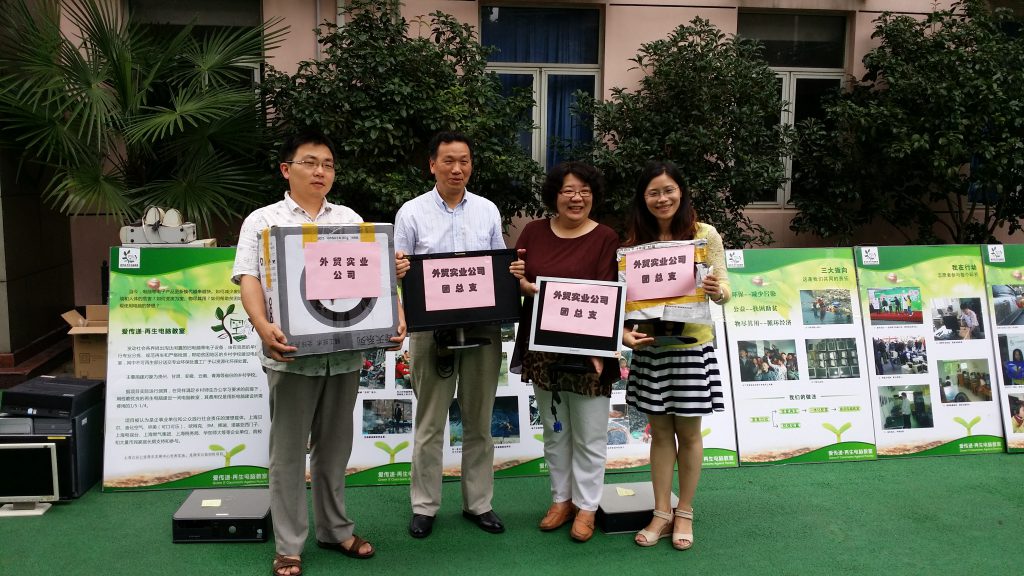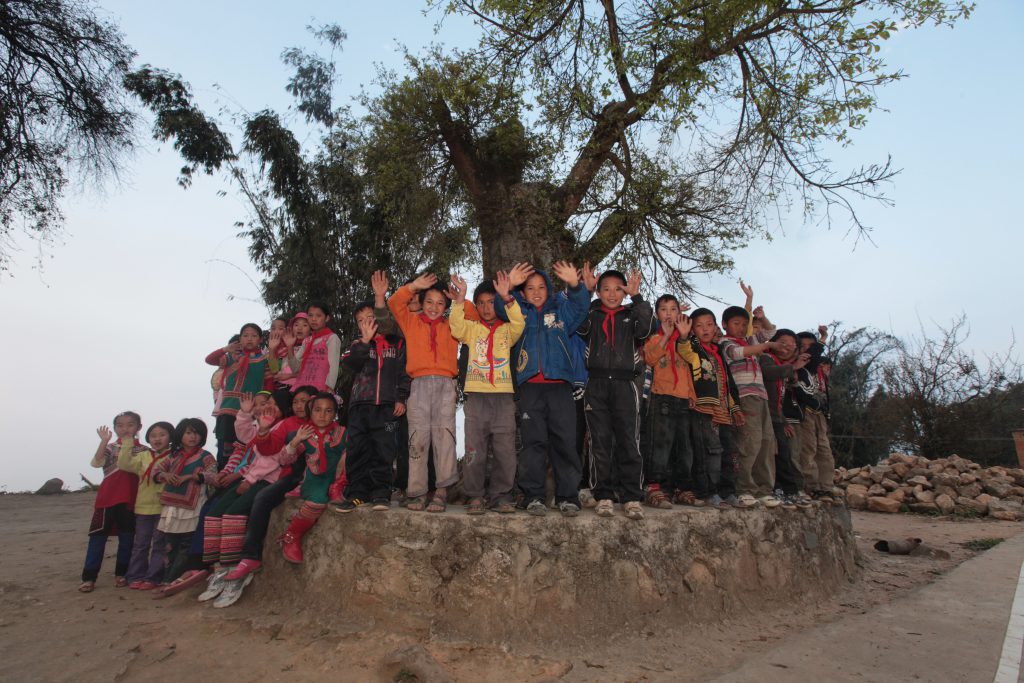According to the report of The Global E-waste Monitor 2017, only one-fifth of the 44.7 million tons of e-waste generated worldwide was recycled in 2016. In China, which generates the most e-waste by volume both in Asia and in the world (7.2 Mt), is estimated that by 2021, and the total amount of e-waste will dispose of more than 52.2 million tons.
With the economic growth and the rapid upgrading of electronic products, more and more electronic products have been discarded. At the same time, tens of millions of school-age children in rural areas, especially in the central and western regions of China, where students have little access to computers and are all looking forward to the opportunity to connect to the world through the Internet.
For Mr. Zhang Binfeng, the Founder and Chairman of Shanghai Zhonggu Charity Youth Development Center, the seemingly unrelated problems were an opportunity for him, and through this interview we learn more about his work. Work that seeks to displace connect environmental protection with poverty alleviation programs in China. We had the honor to speak to and below are some highlights of the interview with Mr. Zhang.

CR: So, Mr. Zhang, could you briefly introduce your organization and how did the idea initially come about?
Zhang:
While we were officially registered June 2012, I began the computer recycling project in 2009 after watching a CBS documentary about global underground electronic waste trade. It was a real shock to me, after that, I had the idea to encourage the public and enterprises to donate their retired electronic products, recycle and dispose them in a more environmentally friendly way.
At the very beginning, we sold the old electronic equipment back to the market and use the income to fund the project or other charitable projects. It didn’t take long for us to realize that this method was not the most ideal.
Electronic devices returning to the market were like kites with broken strings, we couldn’t track their whereabouts, let alone to achieve the ultimate goal of environmentally friendly disposal. So we thought maybe we could maximize the use of these devices and give them to people who need them more?
Thus, we decided to send those “renewed” computers to the village schools so that rural teachers and children can connect to the outside world via internet. They might not physically be able to leave the mountains, but their hearts and mind can.
On the other hand, we can also keep track of these computers and get them back for recycling at the end of their life span.
In this way, “environmental protection”, “circular economy” and “poverty alleviation through education” can become a sustainable closed loop and ultimately formed the comprehensive “Green IT Classrooms Program”.
CR: How many programs do you have?
Zhang:
We have two major projects.
The first one is “Rural Teacher Training Program“. The program pays attention to rural teachers and the concept of “experience”. Teachers from rural areas are regularly invited to Beijing, Shanghai and other big cities, during the trip they have chances to take an airplane, watch a performance, attend a conference, visit a modern enterprise, etc. We hope to use this method to broaden the horizons of these rural teachers and to enhance their ability to guide rural children to a bigger world.
The second one is “Green IT Classrooms Program“. The project is to encourage public to donate their no longer in use computers, organize professionals to recycle and regenerate computers and help rural schools to build computer labs with regenerated computers in good condition. Meanwhile, we also provide necessary training and technical support after the classrooms were established, and eventually recover the computers and disposal them properly.
Other than the above programs, in order to promote the proper disposal of electronic equipment, we also accept all kinds of second-hand electronic products for recycling free of charge.

CR: How do you get your computers?
Zhang: As large companies renew their computers after 3-5 years’ usage, and they always want to find an organization who can help them to further use or properly dispose the devices, we would be a good choice of them. Most of our computers come from corporate donations. We also welcome donations from individuals and communities, we really appreciate their generosity.
CR: As you have introduced before, Zhonggu Charity recycling waste electronic equipment is free of charge and you have 12 full-time staff currently. How do you create a sustainable business model?
Zhang: In addition to providing second-hand electronic equipment, the enterprises also support our project through financial donation. More than 60% of our funding come from corporate donations, which also covers our daily operation and management expenses. With the development of CSR and charitable work in China matures, more and more enterprises are coming to understand and accept that NGOs also need to pay for administration fee. I have always believed that as an NGO capable of sustainable development, it is necessary to carry out two missions: first, it should be specialized, instead of covering everything, the organization must focus on its own expertise. Secondly, professionalization of NGO staff. Only by treating the NGO work as seriously as any other professions and paying them fairly, can the industry become more stable and sustainable. Meanwhile, NGO staff should also grow to be more professional.
CR: You have so many green IT classrooms to build up across China, how do you manage all of them by just 12 staff?
Zhang: Currently we use a regional centralization model to build computer classrooms and provide “online + offline” support in the last 3 years. When planning to build a new classroom, we will arrange visits to those old computer classrooms and provide technical support on site. We also developed an online supporting system that can provide real-time monitoring of the classrooms and provide support remotely. When we build the classrooms, we always train teachers first, so that they can use the computer labs based on their own needs or students’ needs accordingly.
CR: How do you decide whether or not to support them and when to support them?
Zhang:
We have a detailed and fair application and evaluation process to select schools. The results are also depended on how cooperative the schools are and how urgent the school’s situation is. We will also consider the regional centralization situation to allow us to work more efficiently. Of course, donor enterprises can also select areas to align with their own business needs, recommend or select the rural schools based on our existing pool of school and may name the computer labs.
CR: How do you evaluate your impact?
Zhang: We evaluate the results of our program from 3 different aspects, environment, economics and social.
In terms of environment, through our publicity, we promote the concept of electronic waste recycling and collect old computers and other electronic equipment. Among the equipment, computers with good condition would be regenerated, thus reducing carbon emissions as well as reducing the consumption of raw materials, such as copper, iron lead, plastic, etc. therefore, the program helps to protect the environment, reduce health risks and can save resources and energy.
In terms of economics, the budget for building a computer lab with recycled computers costs only 20% to 25% of the cost of building a lab with new computers. With limited resource, energy and budget, this project sets a great example for others to follow. And our model of regional centralization and online supporting system also improved efficiency and saved costs.
In terms of social impact, our program provides a reliable, technology-based platform for many enterprises and individuals who are passionate about realizing their social responsibilities.
Most importantly, rural children we help can have the opportunity to receive a quality education and to connect with the world.
CR: What’s your plan for the next five year?
Zhang: Although we already have gained some awareness in the industry and have offices or contacts in Beijing, Shenzhen and Xi ‘an, our reach is still limited within Shanghai. In the next five years, we hope to become a leading NGO of environmental protection and poverty alleviation in China, replicate and promote our model of sustainable development and the concept of our projects by expending our scales as well as supporting other organizations.

CR: How can our readers and corporate companies support your organization and programs?
Zhang: We welcome companies and individuals to support our projects in terms of manpower, money, goods and technical support. In addition to donating money and equipment, enterprises can organize volunteers to participate in various projects through our platform, we also welcome individual volunteers from the communities to sign up.
With just ¥ 60,000 to ¥ 80,000 or 40 used computers, a computer lab can be set up in a rural school. We are planning to build 80 labs in 2019.
We also hope that everyone can have the awareness of environmental protection, send your electronic products to us or other professional environmental protection disposal agencies for processing. Please do not throw away e-waste or sell to unprofessional individuals or organizations. Your kind action will not only help protect the environment but also help a group of rural children and teachers to be connected to the world.

CR: How can people contact your organization?
Zhang: You can go to our official website www.zhonggu.org.cn, or follow our WeChat account Zhong-gu, of course you are also welcome to call us directly at 021-5299-0731.
Currently, Zhong Gu Charity’s “Green IT Classrooms Program” has collected and properly disposed around 55,000 used electronic equipment. 339 computer labs have been established in 29 provinces such as Yunan, Gansu, Guizhou, Hunan, Sichuan, Anhui, Xizang, Xinjiang, over 130,000 rural teachers and students have been impacted.
